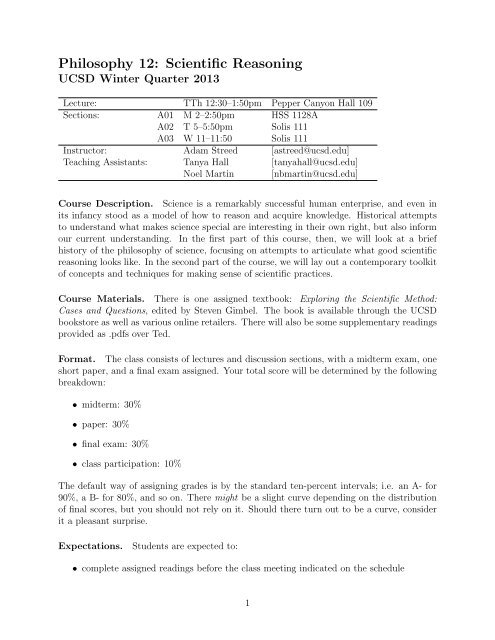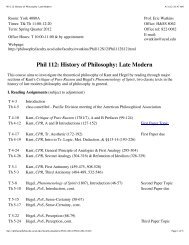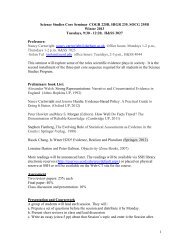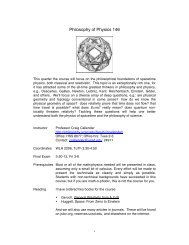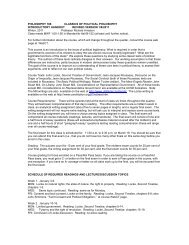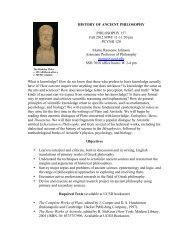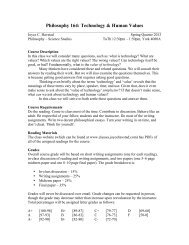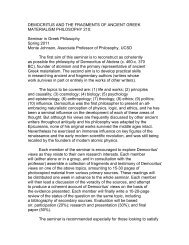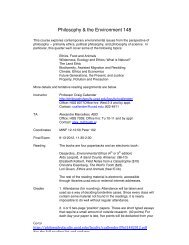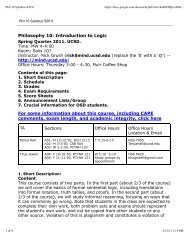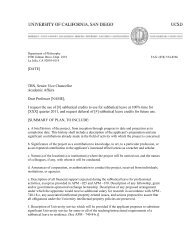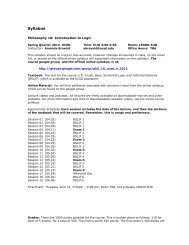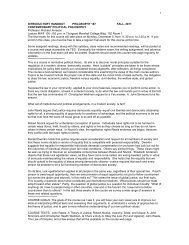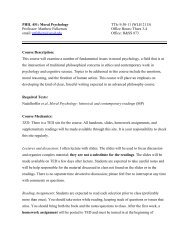Philosophy 12: Scientific Reasoning - UCSD Department of ...
Philosophy 12: Scientific Reasoning - UCSD Department of ...
Philosophy 12: Scientific Reasoning - UCSD Department of ...
You also want an ePaper? Increase the reach of your titles
YUMPU automatically turns print PDFs into web optimized ePapers that Google loves.
<strong>Philosophy</strong> <strong>12</strong>: <strong>Scientific</strong> <strong>Reasoning</strong><strong>UCSD</strong> Winter Quarter 2013Lecture: TTh <strong>12</strong>:30–1:50pm Pepper Canyon Hall 109Sections: A01 M 2–2:50pm HSS 1<strong>12</strong>8AA02 T 5–5:50pm Solis 111A03 W 11–11:50 Solis 111Instructor: Adam Streed [astreed@ucsd.edu]Teaching Assistants: Tanya Hall [tanyahall@ucsd.edu]Noel Martin [nbmartin@ucsd.edu]Course Description. Science is a remarkably successful human enterprise, and even inits infancy stood as a model <strong>of</strong> how to reason and acquire knowledge. Historical attemptsto understand what makes science special are interesting in their own right, but also informour current understanding. In the first part <strong>of</strong> this course, then, we will look at a briefhistory <strong>of</strong> the philosophy <strong>of</strong> science, focusing on attempts to articulate what good scientificreasoning looks like. In the second part <strong>of</strong> the course, we will lay out a contemporary toolkit<strong>of</strong> concepts and techniques for making sense <strong>of</strong> scientific practices.Course Materials. There is one assigned textbook: Exploring the <strong>Scientific</strong> Method:Cases and Questions, edited by Steven Gimbel. The book is available through the <strong>UCSD</strong>bookstore as well as various online retailers. There will also be some supplementary readingsprovided as .pdfs over Ted.Format. The class consists <strong>of</strong> lectures and discussion sections, with a midterm exam, oneshort paper, and a final exam assigned. Your total score will be determined by the followingbreakdown:• midterm: 30%• paper: 30%• final exam: 30%• class participation: 10%The default way <strong>of</strong> assigning grades is by the standard ten-percent intervals; i.e. an A- for90%, a B- for 80%, and so on. There might be a slight curve depending on the distribution<strong>of</strong> final scores, but you should not rely on it. Should there turn out to be a curve, considerit a pleasant surprise.Expectations.Students are expected to:• complete assigned readings before the class meeting indicated on the schedule1
• attend lectures and discussion sections• participate in section• strive for intellectual virtue, including taking arguments seriously, being a respectfullistener, being willing to consider challenges to previously held beliefs, doing one’s ownwork, and acknowledging the contributions <strong>of</strong> othersComputers in Class. Laptops and other such devices are permitted in class, but shouldbe used only for taking notes and consulting course documents. If you simply cannot helpchecking Facebook, shopping online, watching sports highlights, or what have you, please sitin the back row so as not to distract other, more attentive students.Talking in Class. Asking questions is strongly encouraged—you should always feel freeto raise any question you have, even on a minor point <strong>of</strong> clarification. However, don’t holdany side conversations, even about the class material. It is vital that every student is giventhe opportunity to hear a speaker (whether the lecturer or another student) without beingdistracted by their neighbors. Any students who hold side conversations after being given awarning will be asked to leave the classroom.Academic Honesty. Students are expected to do their own work, as outlined in the<strong>UCSD</strong> Policy on Integrity <strong>of</strong> Scholarship published in the <strong>UCSD</strong> General Catalog. Academicmisconduct includes but is not limited to:• Cheating, such as using “crib notes” or copying answers from another student duringan exam, modifying a graded exam and returning it for a new grade, or submitting thesame paper or assignment for two or more di↵erent courses unless authorized by theinstructors concerned.• Plagiarism, suchasusingthewritingsorideas<strong>of</strong>anotherperson,eitherinwholeorinpart, without proper attribution to the author <strong>of</strong> the source.• Collusion, suchasengaginginunauthorizedcollaborationonhomeworkassignmentsor take home exams, completing for another student any part or the whole <strong>of</strong> an assignmentor exam, or procuring, providing or accepting materials that contain questionsor answers to an exam or assignment to be given at a subsequent time.The General Catalog can be found at http://www.ucsd.edu/catalog/. More helpful informationcan be found at http://academicintegrity.ucsd.edu. It is your responsibility tounderstand the Policy; if you have any questions about what constitutes acceptable work,please contact me or your TA.2
Schedule.Ted:The following is provisional; any changes will be announced in class and overWeek Date Topics Readings1 Tues 1/8 Class Introduction. Science, none!Logic, <strong>Reasoning</strong>.Thurs 1/10 The Syntactic View;Aristotle, Prior Analytics and PhysicsDeductivism.2 Tues 1/15 Deductivism Descartes, Discourse on MethodThurs 1/17 Deductivism’s Di culties case studies [TBA]3 Tues 1/22 Inductivism Bacon, Novum OrganumNewton, Principia MathematicaThurs 1/24 Inductivism Mill, A System <strong>of</strong> Logic4 Tues 1/29 Hypothetico-Deductivism Carnap, “Theoretical Procedures in Science”Braithwaite, <strong>Scientific</strong> ExplanationThurs 1/31 Paradoxes <strong>of</strong> Evidence Hume, EnquiryGoodman, Fact, Fiction, and ForecastHempel, “Studies in the Logic <strong>of</strong> Confirmation”5 Tues 2/5 MIDTERM EXAMThurs 2/7 Falsificationism Popper, The Logic <strong>of</strong> <strong>Scientific</strong> Discovery6 Tues 2/<strong>12</strong> Holism Duhem, The Aim and Structure <strong>of</strong> Physical TheoryKuhn, The Structure <strong>of</strong> <strong>Scientific</strong> RevolutionsThurs 2/14 Holism Lakatos, The Methodology <strong>of</strong> Research Programmes7 Tues 2/19 The Semantic View Black, “Models and Archetypes”Giere, Explaining ScienceThurs 2/21 Critical Approaches Feyerabend, Against MethodHubbard, “Science, Facts, and Feminism”8 Tues 2/26 Cognitive Biases & Other PAPER DUETrapsPiattelli-Palmarini, Inevitable IllusionsMartin, There are Two Errors in the the Title<strong>of</strong> This BookThurs 2/28 Observation & Experimentation:noneBasic Concepts9 Tues 3/5 Statistical Tools for <strong>Reasoning</strong> noneThurs 3/7 <strong>Reasoning</strong> about Causes none10 Tues 3/<strong>12</strong> Visualizing Information Tufte, Visual ExplanationsThurs 3/14 Marginal Science (a.k.a. Pseudoscience)Feynman, “Cargo Cult Science”Giere et al., Understanding <strong>Scientific</strong> <strong>Reasoning</strong>F Tues 3/19 FINAL EXAM3


